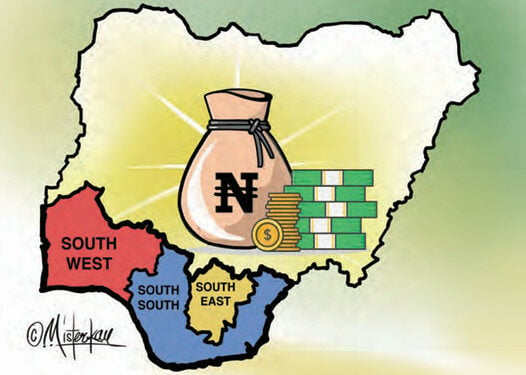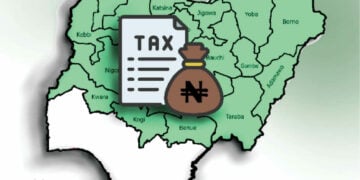Today, as in the last three weeks, I continue my region-by-region analysis of the 2025 Phillips Consulting State Performance Index (pSPI). This week, the focus is on the South-South, Nigeria’s oil-rich zone comprising Cross River, Edo, Delta, Akwa Ibom, Rivers, and Bayelsa. For decades, the region has been described as Nigeria’s treasure chest. Oil revenues extracted from its soil sustain federal finances, its ports are gateways to global trade, and its people are renowned for resilience and creativity. Yet when judged by the cold data of the pSPI, the South-South is exposed as a region long on wealth but short on progress.
Cross River, at 14th, emerges as the region’s best performer. Edo follows in 16th, Delta in 17th, Akwa Ibom in 21st, Rivers in 25th, and Bayelsa drags at 29th. None of these positions matches the region’s potential or its revenue profile. Instead, the South-South region has become a classic example of the “resource curse” – where abundance of natural wealth creates complacency, weakens institutions, and discourages innovation. The paradox recalls Carthage, which once commanded Mediterranean trade but ultimately fell to Rome’s discipline and unity. Wealth without vision is never enough.
Cross River and Edo: The Nearly States
Cross River, ranked 14th, shows flickers of reform. Its tourism sector has been revived, fiscal management somewhat improved, and citizen perception marginally better. Yet it still struggles with industrial depth and weak rural infrastructure. The unfulfilled promise of Tinapa lingers, a ghost of ambition without execution. Cross River resembles Florence during the Renaissance: alive with ideas, experimenting with innovation, but constrained by size and internal contradictions. Its leaders appear aware of the possibilities but often lack the resources or political will to make them enduring. The pSPI scores confirm a state that is competent but cautious, reform-minded but not transformative.
Edo, in 16th place, is equally underwhelming. Historically, it has been a centre of culture and administration, inheritor of the legacy of the Benin Kingdom. Its strategic location should make it a bridge of commerce between zones, yet its governance feels timid. It mirrors Vienna in the waning days of the Habsburg Empire – rich in pedigree, but hesitant in modern leadership. Projects are launched but stall, fiscal systems improve but lack transparency, and citizen perception remains tepid. For a state with such a proud history, the mediocrity of present outcomes is deeply disappointing. Edo should be setting the pace for the region; instead, it seems content with being average.
Delta and Akwa Ibom: Potential in Search of Purpose
Delta, at 17th, remains a paradox. It is one of the richest states in terms of oil revenue, yet governance outcomes fall into mediocrity. Like Argentina in the early 20th century, Delta is blessed with resources but trapped by short-term politics and fiscal waste. Citizens know the state is wealthy, but they do not feel that wealth in their daily lives. Infrastructure crumbles, unemployment festers, and service delivery limps. The contradiction is stark: a state that should be a model of oil wealth management instead struggles with basic delivery. Delta’s middling ranking reflects governance that is procedural rather than purposeful.
Akwa Ibom, ranked 21st, is another cautionary tale. Once praised for prudent management of oil wealth, it now stagnates. Investments in infrastructure have produced visible projects, but sustainability is in doubt. Diversification remains shallow, and industrialisation slow. The trajectory recalls Spain in its silver boom – sudden riches that fostered grandeur but eroded discipline, leaving the economy fragile. Unless Akwa Ibom pivots decisively toward education, technology, and agro-industrial growth, it risks sliding further down the index. Its people, energetic and creative, deserve better than the complacency that oil wealth has fostered. The gap between potential and performance is wide, and widening still.
Rivers and Bayelsa: Wealth Without Transformation
Rivers, at 25th, should be a national powerhouse. Port Harcourt, the so-called “Garden City,” hosts Nigeria’s oil and gas industries, international companies, and maritime assets. Yet the state is marked by infrastructural decay, erratic services, and declining trust. It resembles Weimar Berlin – bustling and cosmopolitan, yet weakened by volatility and fragile institutions. Governance appears reactive, shaped by cycles of elite contestation rather than long-term planning. For a state with such strategic assets, mediocrity is inexcusable. The pSPI captures a state weighed down by underachievement and squandered potential.
Bayelsa, at 29th, fares the worst in the region despite being the heart of Nigeria’s oil production. With its small population, development should be easier. Instead, fiscal mismanagement, insecurity, and poor service delivery dominate. It is the most damning example of the resource curse, recalling Congo under King Leopold where immense natural wealth produced exploitation without empowerment. Bayelsa’s predicament is perhaps the clearest warning to the entire region: oil wealth without governance reform is a poisoned chalice. The people see resources extracted from their soil daily, yet their schools and hospitals languish. This disconnect is unsustainable and politically dangerous.
The Region’s Deeper Malaise
What unites the South-South is not just middling rankings but a disturbing absence of urgency. Federal allocations derived from oil rents create a cushion that discourages reform. While states like Jigawa or Adamawa improve their rankings through discipline and innovation, the South-South appears content to rely on oil wealth. This detachment is dangerous. History warns that elites who govern from the comfort of opulence while neglecting their people invite instability. France before 1789 is a prime example: Versailles glittered even as Paris starved.
Citizen perception scores reinforce this malaise. Across the South-South, people feel alienated from governance, excluded from decisions, and cheated of their fair share of wealth. This erosion of trust is politically combustible. No state, however wealthy, can sustain legitimacy without public confidence. The Bourbon kings discovered this too late. The lesson should not be lost here: public trust is the true currency of governance.
A Roadmap for Renewal
If the South-South is to escape decline, four imperatives stand out. First, diversify aggressively. Oil revenues are dwindling in global importance, and the region’s agricultural potential – from palm oil to fisheries to rice – remains largely untapped. Agro-processing hubs should be prioritised, and linkages to export markets developed.
Second, prioritise human capital. Schools and hospitals must become genuine centres of transformation, not mere statistics in budgets. Teachers must be trained and paid, health centres equipped and staffed, and youth skills programmes linked to actual industries. The dividends of oil must be channelled into people, not vanity projects.
Third, institutionalise transparency. Fiscal reporting must be timely, budgets participatory, and service delivery digitised. Technology can close gaps of accountability that oil wealth has long concealed. An era of open data and citizen monitoring is overdue.
Fourth, embrace regional integration. A South-South economic corridor linking ports, industrial parks, and agro-processing centres could echo the Hanseatic League, when trading cities in Northern Europe pooled strength for mutual prosperity. The South-South has the assets; what it lacks is coordinated vision.
Above all, the region’s leaders must rediscover urgency. The pSPI has shown us the mirror: Cross River competent but constrained, Edo hesitant, Delta and Akwa Ibom drifting, Rivers squandered, Bayelsa failing. Unless these states change course, they will be remembered not for their riches but for the renaissance they never achieved.





